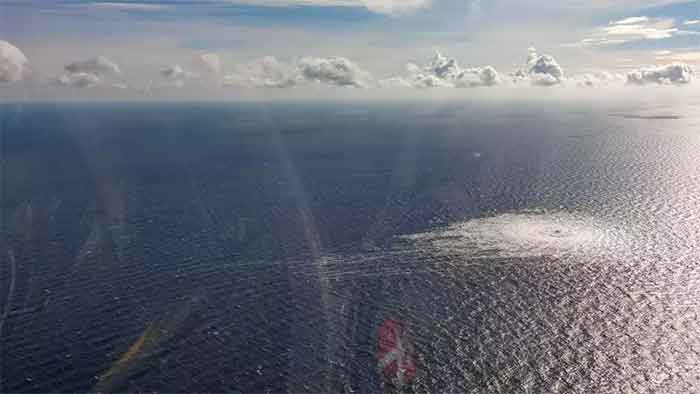
A state actor’s involvement in the blast of the Nord Stream pipelines last year is the “absolute main scenario”, said the Swedish prosecutor investigating the attack.
A Reuters report — State actor involvement in Nord Stream pipeline attacks is ‘main scenario’, says Swedish investigator, April 6, 2023, — said:
A state actor’s involvement in the blast of the Nord Stream pipelines last year is the “absolute main scenario”, though confirming identity will prove difficult, the Swedish prosecutor investigating the attack said on Thursday.
In September 2022, several unexplained underwater explosions ruptured the Nord Stream 1 and newly-built Nord Stream 2 pipelines that link Russia and Germany across the Baltic Sea. The blasts occurred in the economic zones of Sweden and Denmark and both countries say the explosions were deliberate, but have yet to determine who was responsible.
The blast in the Swedish zone occurred at a depth of 80 meters, which the Swedish prosecutor said made it complicated to investigate.
“We believe it will be rather difficult to determine who did this,” prosecutor Mats Ljungqvist told Reuters in a phone interview.
“The people who did this have probably been aware that they would leave clues behind and probably took care so that the evidence would not point in one direction, but in several directions,” he added.
“That makes it difficult to clearly point to one actor.”
The investigation continues.
Nord Stream 1 and Nord Stream 2, each consisting of two pipes, were built by Russia’s state-controlled Gazprom to pump 110 billion cubic meters (bcm) of natural gas a year to Germany.
Ljungqvist said investigators had been able to determine what type of explosive had been used and that it ruled out “a very large number of actors”, but declined to name the explosive, citing the ongoing nature of the investigation.
While no conclusion has been drawn there have been a number of theories as to who blew up the pipelines and how.
Ljungqvist said it could not be completely ruled out that an independent group, as opposed to a state actor, was behind the attack, but that it was unlikely.
“There are certain companies that have certain special missions that mean they could, in theory, carry this out,” he said. “We do not rule out anything, but that it is a state actor who is directly or at least indirectly behind this is of course our absolute main scenario, given all the circumstances.”
U.S. journalist Seymour Hersh reported earlier this year that U.S. authorities, with aid of the Norwegian military, were behind the attack.
Both the U.S. and Ukraine have denied having anything to do with the attacks as has Russia.
Moscow has blamed the explosions on Western sabotage.
Ljungqvist said the incident had become an open arena for attempts to influence the hotly debated proceedings, likely with the purpose of deliberately sowing confusion.
“I do not want to comment on any specific report but I can conclude that many of the hot theories can be easily ruled out based on what we know from the investigation,” he said.
AP Report
An AP report — Sweden: State actor likeliest culprit for pipeline sabotage, April 6, 202, https://apnews.com/article/sweden-denmark-nord-stream-gas-pipeline-explosions-ea40f35b8d96dd201a8fa75fe1db953d — said:
Swedish prosecutors said Thursday a state actor was the most likely culprit for the explosions that incapacitated the Nord Stream gas pipelines in the Baltic Sea last year, an act deemed as sabotage. However, they cautioned that the identity of the perpetrator was still unclear and hinted that it was likely to remain so.
Public prosecutor Mats Ljungqvist from the Swedish Prosecution Authority said in a statement that his office’s investigation is focused on examining if Swedish interests or Swedish security were threatened by the act.
The Swedish authorities are also keen to find out whether the explosions were prepared on their territory. “Our hope is to be able to confirm who has committed this crime” but “it should be noted that it likely will be difficult given the circumstances,” Ljungqvist said.
Ljungqvist stressed that the case — labeled by Swedish prosecutors as “gross sabotage” — is complex, and hence time-consuming to investigate. The prosecutors’ office gave no estimate on when the Swedish investigation would wrap up.
“This concerns a crime whose circumstances are difficult to investigate. The detonations took place 80 meters (262 feet) under the water on the ocean floor in the Baltic Sea,” Ljungqvist said.
Separately, he told Swedish media that prosecutors’ main line of investigation is on whether a state actor was behind the explosions, given the substantial resources and skills needed to carry out such an attack.
“We are not ruling out that there could be non-state actors capable of doing this,” Ljungqvist told the Swedish news agency TT. “But then we are dealing with very few companies or groups. Considering all the circumstances, our main (investigation) track is that it is a state that is behind it.”
A total of four leaks were discovered on the Nord Stream 1 and 2 gas pipelines that run from Russia to Germany through the Baltic Sea, on Sept. 26 and 27 respectively.
Two of the leaks were in the Swedish economic zone, northeast of the Danish island of Bornholm, and two in the Danish economic zone, southeast of Bornholm. Both Swedish and Danish seismic measurements showed that explosions took place a few hours before the leaks were discovered.
Authorities and investigators in Denmark, Sweden and other countries early on suspected the explosions were deliberate attacks and consider them sabotage. The pipelines were not operational at the time, due to disputes between Russia and the EU amid the war in Ukraine.
The U.S. and some of its allies have long criticized the pipelines, warning that they posed a risk to Europe’s energy security by increasing the continent’s dependence on Russian gas.
